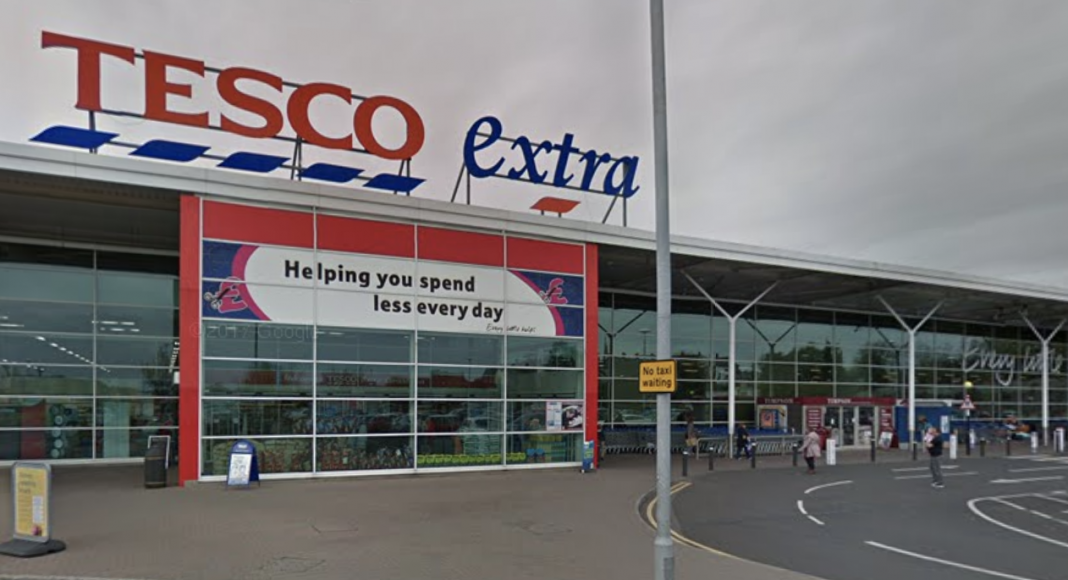News
Could you survive on £248 a month?
13th May 2021
-
Share this:
- Share on facebook
- Share on twitter
- Share on linkedin
People forced to food banks at start of pandemic faced extreme poverty, with just £248 a month to survive on after housing costs, according to new research

Press Release
People forced to food banks at start of pandemic faced extreme poverty, with just £248 a month to survive on after housing costs, according to new research
Antrim Foodbank – seeded by the Trussell Trust – is backing calls for government at all levels to commit to working to end the need for food banks for good as the Trussell Trust launches a study at a cross-party political event
Today, the Trussell Trust reveals State of Hunger 2021, a follow-up to the most authoritative piece of independent research into hunger in the UK to date. Commissioned by the charity and conducted by Heriot-Watt University, the study sheds light on the groups of people across the UK disproportionately affected by hunger and the drivers behind food bank use.
More than six in ten (62%) working-age people referred to a food bank in early 2020 were disabled – that’s more than three times the rate in the UK working-age population. And single-parent families are more likely to be forced to a food bank with almost one in five (18%) households referred to food banks during the pandemic being single parents – that’s more than twice the rate in the general population (8%).
The charity says hunger in the UK isn’t about food, it’s about people not having enough money for the basics. The research shows extremely low income is a key factor in driving people to food banks. In early 2020, the average monthly household income after housing costs for people who needed to use a food bank was £248 on average, or £8 a day for a couple without children. This needs to cover energy and water costs, council tax, food, and other essentials and is just 13% of the average national income.
In fact, in early 2020 95% of people referred to food banks in the Trussell Trust network were living in ‘destitution’ – this means people cannot afford to eat and stay warm and dry.
The main reason people had such low income was due to social security payments failing to cover the cost of living, according to the research. This was more often than not due to the design of the system, including issues such as the five-week wait for a first Universal Credit payment and low levels of payments.
Worryingly, the charity says people living in destitution risk being further pulled under by difficulties, such as debt and mental health issues. The research finds in mid-2020 nine in 10 households at food banks were in debt, while six in 10 had arrears on bills and owed money on loans.
In mid-2020 47% of all people using food banks and 41% of disabled people referred were indebted to the Department for Work and Pensions (DWP) making it the most common creditor to people at food banks. People experiencing poor mental health referred to food banks in the Trussell Trust network grew from around half (51%) in early 2020 to almost three quarters (72%) in mid-2020.
With high rates of unemployment and redundancies, the charity says more people than ever are now likely to need the social security system to provide a lifeline to keep them afloat. The charity says this should start with keeping the £20 increase to Universal Credit introduced during the pandemic but set to be removed in the autumn.
The findings will be discussed by panellists such as Dame Louise Casey and Baroness Stroud at an All-Party Parliamentary Group event on destitution later today.
Emma Revie, chief executive of the Trussell Trust, said:
How can anyone in this country stay warm and dry and buy food on just £248 a month after rent? People struggling in extreme poverty are pushed to the doors of food banks because they do not have enough money to survive. Hunger in the UK isn’t about food – it’s about people not being able to afford the basics. We know we can change this. We need to change the conversation around poverty and take action together. We need government at all levels to commit to ending the need for food banks once and for all and to develop a plan to do so. It’s time for government to make this a priority – to recognise that it must be an essential part of their levelling up agenda to work towards a hunger free future where we can all afford the basics.
Fionnuala O’Donnell, Manager at Antrim Foodbank, said:
Last year, food banks in the Trussell Trust network gave out a record 2.5 million emergency food parcels to people in crisis – at Antrim Foodbank, we gave out a shocking 1227 of those, up 41% on the previous year. No one should be forced to use a food bank because they can’t afford the essentials.
Dame Louise Casey, former government adviser on social policy, said:
This research today by the Trussell Trust is deeply worrying with record food bank use showing that too many people have been pushed into hardship by the pandemic. We have to stand together as we pull through this pandemic and not leave people behind, forced to rely on food banks and handouts to keep going. That is an abject failure by Government and all of us. Food aid should be a one-off in the UK not a new form of charity. It is in this government’s gift to end hunger, but it warrants a concerted cross-government and cross-party action – a plan to end the need for food banks, delivered as an urgent priority.
The Trussell Trust is urging the public to sign up to its Hunger Free Future movement www.trusselltrust.org/hungerfree to become part of a new conversation about how, together, we can end the need for food banks.
ENDS
Contact
The report will go live on Thursday May 13, at www.trusselltrust.org. Contact the Trussell Trust for a copy of the embargoed report on 020 3137 3699 or [email protected]
Antrim Foodbank Manager: Fionnuala O’Donnell on 028 9454 8555 or [email protected].
Download the campaign graphic at: https://antrim.foodbank.org.uk/wp-content/uploads/sites/36/2021/05/not-inevitable.png
Notes to editors
- The State of Hunger is a three-year independent research programme, commissioned by the Trussell Trust and conducted by I-SPHERE at Heriot-Watt University. It is the largest study of hunger in the UK.
- ASDA’s Fight Hunger Create Change partnership funded this study and has enabled food banks in the Trussell Trust network to support more people in crisis with access to food and advice services, to help tackle the root causes of poverty.
- The main report provides robust evidence on the experiences of those in the UK affected by hunger, and the drivers of food bank use. The main report can be read here.
- It utilises a wide range of surveys, interviews and statistical analysis to draw these conclusions. The conclusion on the relationship between low income and social security is drawn from across these data sources.
- The main data in this report refers to people referred to food banks in the Trussell Trust network. Significant populations of people are supported by independent food banks.
- Data on people referred to food banks in the Trussell Trust network in early 2020 refers to a survey of 716 adults 18+ conducted face to face at 43 food banks in the Trussell Trust network between 15 January and 12 March 2021.
- Data on people referred to food banks in the Trussell Trust network in mid-2020, or referenced as ‘during the pandemic’ refers to a survey of 436 adults 18+ conducted online, with invitations issued by 43 food banks in the Trussell Trust network. Fieldwork was conducted between 22 June to 30 July 2020.
- In early 2020 the equivalised monthly household income (after housing costs) of households referred to food banks was £248. This increased to £335 after the first few weeks of the pandemic, most likely due to the £20 increase in the weekly rate of the Universal Credit Standard Allowance.
- People taking part in the early 2020 survey are classed as disabled according to the Equality Act 2010 definition of disability.
- The definition of destitution is derived by the Joseph Rowntree Foundation. More information can be found here.
- The growth in the proportion of people living with poor mental health is reported on whether anyone in the referred household has poor mental health.
- For December 2020 to February 2021 the unemployment rate for those aged 16+ was 4.9%, up from 4.0% in the previous year. Labour Market Overview
- Redundancies have reached record levels during the pandemic and increased by a historic 181,000 between Q2 2020 and Q3 2020, a 138% increase. Labour Market Overview
About Antrim Foodbank:
- Antrim Foodbank is part of The Trussell Trust’s UK Foodbank Network. Between 1 April 2020 and 31 March 2021, food banks in the Trussell Trust’s network distributed 2.5 million emergency food parcels to people in crisis, a 33% increase on the previous year. Almost a million of these went to children – that is almost two parcels every min. Trussell Trust foodbanks provide a minimum of three days’ emergency food to people in crisis. Over 90% of food given out by foodbanks is donated by the public.
- All those who receive emergency food are referred by frontline care professionals such as doctors, social workers and Community Advice advisers.
- Food parcels typically contain items such as tinned fruit and vegetables, tinned meat and fish, pasta, sauces, long-life juice, UHT milk, cereal, tea, rice pudding, biscuits and soup.
- Last year Antrim Foodbank collected 21 Tonnes of food from the public and provided emergency food to 2,832 people of which 1,223 were children.
- 1 in 5 people live below the poverty line in the UK.
We know the main reasons why people need emergency food are:
- Problems with the benefits system (delays, inadequacy and reductions)
- Challenging life experiences or ill-health
- Lack of informal support
- Poverty isn’t inevitable, and there is something we can all do to help build a future where no one needs a food bank.
- Other reasons for referrals include delayed wages, domestic violence, sickness, unemployment, debt, benefit changes, refused short-term benefit advance, homelessness and absence of free school meals during school holidays.
- The average weekly income of households at food banks is only £50 after paying rent.
For more on Antrim Foodbank visit antrim.foodbank.org.uk
About the Trussell Trust:
- We’re here to end the need for food banks in UK.
- We support a UK-wide network of more than 1,300 food bank centres and together we provide emergency food and support to people locked in poverty, and campaign for change to end the need for food banks in the UK.
- Our most recent figures for the number of emergency food supplies provided by our network: https://www.trusselltrust.org/news-and-blog/latest-stats/
- The Trussell Trust’s food bank network brings together volunteers, staff and supporters of all faiths and none to make a difference. Local churches play a vital part in this work, with around 12,000 churches actively involved in donating food, and providing venues, volunteers and financial support for food banks.
- You can read more about our work at: https://www.trusselltrust.org


